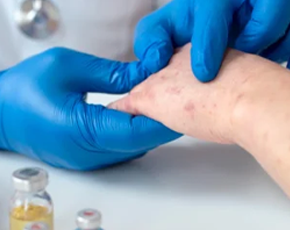skin diseases are often seen as a reflection of imbalances in the body's internal systems, particularly in the doshas (Vata, Pitta, and Kapha), and dhatus (tissues). Ayurveda emphasizes the importance of maintaining harmony between the body's internal and external environments. Skin issues are thought to arise from poor digestion, imbalanced doshas, toxins (known as ama), and emotional factors. Excessive intake of yogurt, fish, black gram, radish, sesame, jaggery, milk and milk products, fermented foods, unctuous or oily foods, and sour food prepared with vinegar or sauce
Exercising immediately after meals, getting angry after meals, drinking cold water, or taking a bath with cold water immediately after physical exercise. Suppression of natural urges can vitiate the doshas, leading to skin diseases. According to Ayurveda, skin diseases are categorized into two main types: Mahakushta (Major Skin Diseases) and Kushta (Minor Skin Diseases). Mahakushta includes seven types such as Kaapaala Kushta, Audumbara Kushta, Mandala Kushta, and more. A comprehensive detoxification therapy that removes toxins from the body and restores doshic balance. Use of herbs like Neem, Turmeric, Sandalwood, and Aloe Vera to treat skin infections and promote healing2. A balanced diet tailored to the individual's dosha constitution to restore equilibrium and alleviate skin problems. Regular practice of yoga and meditation to reduce stress and improve overall well-being. Application of Ayurvedic ointments and medicines to relieve skin lesions, wounds, or irritation. Ayurveda offers a natural and holistic approach to treating skin diseases, focusing on internal balance, detoxification, and nourishing the skin through herbs, oils, and lifestyle changes.



